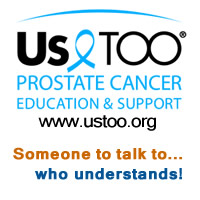|
||||||||
| Home | News You Can Use |
About Us TOO Florence |
Personal Journeys | Slideshows | Contact Us | |||
| Each man's Journey is listed under his BASIC treatment. When you click on one of the names to read a particular Journey, you may see one or more different treatments in bold lettering immediately above the Journey text. You will see (Recurrence) if they are due to a recurrence. Otherwise, they will be treatments used in conjunction with the basic treatment, i.e. Lupron with External Beam Radiation or External Beam Radiation with HDRT/Brachytherapy, etc. | |
Active Surveillance Alternative (Natural) Therapy Cryoablation - Freezing Hormone Therapy Radiation - Brachytherapy Radiation - External Beam Radiation - HDRT Surgery - Open Surgery - Robotic |
I see my journey through the world of prostate cancer as a five-phase journey. These are: diagnosis, evaluation, treatment, recovery and the ongoing support of other prostate cancer patients. As with most men my journey began with an elevated PSA. My primary care doctor saw that my PSA was over 5 for several consecutive tests and recommended I get a urological evaluation. I went to our local urologist, Dr. Kusuda in Coos Bay. His exam was indeterminate; my prostate was not enlarged so he recommended a biopsy. I had the biopsy procedure performed and it was determined I had an early stage prostate cancer. My Gleason Score was a non-aggressive 6 (3+3), a good one to have if one has to have prostate cancer. This kind of concluded the diagnosis phase. The next phase was evaluating the possible treatments. Dr. Kusuda recommended surgery to remove the prostate but told me that radiation was also available in Coos Bay. Before taking any action, I went to a seminar in Portland and learned of many other treatment options. I read several articles and books on prostate cancer. A friend of mine took me to the Us TOO meeting in Florence where I met Dr. Mehlhaff, a urologist at Oregon Urology Institute in Springfield. He was very informative. Also attending the meeting was Bill Force who had undergone robotic surgery with Dr. Mehlhaff less than two weeks prior to the meeting. He looked and felt great. That was what I wanted with the same results. Following the meeting I had an opportunity to personally speak with Dr. Mehlhaff. Hearing that I was very interested in Bill Force's treatment and outcome, he suggested I see him to discuss robotic surgery. I scheduled an appointment and met with him at Oregon Urology Institute. He analyzed my pathology report and my general health and said I was a good candidate for robotic surgery. He also discussed all the other treatment options with me. After talking it over with my wife we decided to go ahead with the robotic surgery and Dr. Mehlhaff. This concluded the evaluation phase. On Jan. 6, I had robotic surgery performed by Dr. Mehlhaff at the McKenzie-Willamette Hospital in Springfield to remove my prostate gland. That was the treatment phase. I began my recovery. I was in the hospital for two days but by the evening of the day of surgery I was walking around the hospital floor. I stayed an extra day because of the distance from my home. I was discharged and sent home with my catheter in place and some pain medication. On the second day I was home I was outside walking around my neighborhood. I had almost no pain and other than discomfort from the catheter the process was fine. A week later I returned to Dr. Mehlhaff and he removed the catheter and pronounced me a "model patient for robotic surgery." I continued my recovery with no further issues. Today I am fully recovered. I have some minor temporary issues with urinary "leakage" but no other effects of the process. The final phase of my journey is the ongoing contact with prostate cancer victims. A friend of mine from here in Bandon was diagnosed recently and we talked a lot about my surgery and the other options for him. This is a very fulfilling experience. To be able to help other men who are going through the same physical and psychological process I went through is very important to me. The work that the men in Us TOO do in Florence is a critical piece of the healthcare for this disease on the Southern Oregon Coast. Support groups are a great venue to find out and exchange information. The contribution of Dr. Mehlhaff to this group is outstanding. |
| www.ustooflorence.org Copyright © 2010 - 2026 | |

